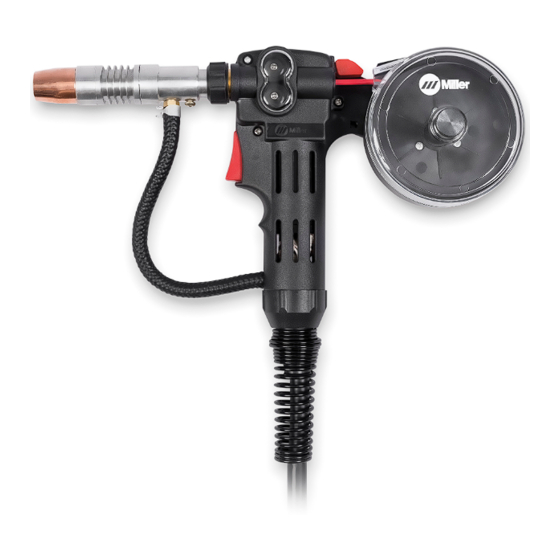Miller Spoolmate 150 Manuel du propriétaire - Page 7
Parcourez en ligne ou téléchargez le pdf Manuel du propriétaire pour {nom_de_la_catégorie} Miller Spoolmate 150. Miller Spoolmate 150 36 pages.

CYLINDERS can explode if
damaged.
Compressed gas cylinders contain gas under high
pressure. If damaged, a cylinder can explode.
Since gas cylinders are normally part of the weld-
ing process, be sure to treat them carefully.
� Protect compressed gas cylinders from excessive heat, mechani-
cal shocks, physical damage, slag, open flames, sparks, and arcs.
� Install cylinders in an upright position by securing to a stationary
support or cylinder rack to prevent falling or tipping.
� Keep cylinders away from any welding or other electrical circuits.
� Never drape a welding torch over a gas cylinder.
� Never allow a welding electrode to touch any cylinder.
1-3.
Additional Hazards For Installation, Operation, And Maintenance
FIRE OR EXPLOSION hazard.
� Do not install or place unit on, over, or near com-
bustible surfaces.
� Do not install unit near flammables.
� Do not overload building wiring — be sure power
supply system is properly sized, rated, and protected to handle
this unit.
FALLING EQUIPMENT can injure.
� Use lifting eye to lift unit only, NOT running gear,
gas cylinders, or any other accessories.
� Use correct procedures and equipment of ad-
equate capacity to lift and support unit.
� If using lift forks to move unit, be sure forks are long enough to ex-
tend beyond opposite side of unit.
� Keep equipment (cables and cords) away from moving vehicles
when working from an aerial location.
� Follow the guidelines in the Applications Manual for the Revised
NIOSH Lifting Equation (Publication No. 94-110) when manually
lifting heavy parts or equipment.
OVERUSE can cause
OVERHEATING.
� Allow cooling period; follow rated duty cycle.
� Reduce current or reduce duty cycle before start-
ing to weld again.
� Do not block or filter airflow to unit.
FLYING SPARKS can injure.
� Wear a face shield to protect eyes and face.
� Shape tungsten electrode only on grinder with
proper guards in a safe location wearing proper
face, hand, and body protection.
� Sparks can cause fires—keep flammables away.
STATIC (ESD) can damage PC
boards.
� Put on grounded wrist strap BEFORE handling
boards or parts.
� Use proper static-proof bags and boxes to store,
move, or ship PC boards.
MOVING PARTS can injure.
� Keep away from moving parts.
� Keep away from pinch points such as drive rolls.
� Never weld on a pressurized cylinder—explosion will result.
� Use only correct compressed gas cylinders, regulators, hoses,
and fittings designed for the specific application; maintain them
and associated parts in good condition.
� Turn face away from valve outlet when opening cylinder valve. Do
not stand in front of or behind the regulator when opening the
valve.
� Keep protective cap in place over valve except when cylinder is in
use or connected for use.
� Use the proper equipment, correct procedures, and sufficient
number of persons to lift, move, and transport cylinders.
� Read and follow instructions on compressed gas cylinders, asso-
ciated equipment, and Compressed Gas Association (CGA) publi-
cation P-1 listed in Safety Standards.
WELDING WIRE can injure.
� Do not press gun trigger until instructed to do so.
� Do not point gun toward any part of the body, other
people, or any metal when threading welding wire.
BATTERY EXPLOSION can injure.
� Do not use welder to charge batteries or jump start
vehicles unless it has a battery charging feature
designed for this purpose.
MOVING PARTS can injure.
� Keep away from moving parts such as fans.
� Keep all doors, panels, covers, and guards closed
and securely in place.
� Have only qualified persons remove doors, panels,
covers, or guards for maintenance and troubleshooting as
necessary.
� Reinstall doors, panels, covers, or guards when maintenance is
finished and before reconnecting input power.
READ INSTRUCTIONS.
� Read and follow all labels and the Owner's Manual
carefully before installing, operating, or servicing
unit. Read the safety information at the beginning
of the manual and in each section.
� Use only genuine replacement parts from the manufacturer.
� Perform installation, maintenance, and service according to the
Owner's Manuals, industry standards, and national, state, and lo-
cal codes.
H.F. RADIATION can cause
interference.
� High-frequency (H.F.) can interfere with radio navi-
gation, safety services, computers, and communi-
cations equipment.
� Have only qualified persons familiar with electronic equipment per-
form this installation.
� The user is responsible for having a qualified electrician promptly
correct any interference problem resulting from the installation.
� If notified by the FCC about interference, stop using the equipment
at once.
� Have the installation regularly checked and maintained.
� Keep high-frequency source doors and panels tightly shut, keep
spark gaps at correct setting, and use grounding and shielding to
minimize the possibility of interference.
OM-272384 Page 3
